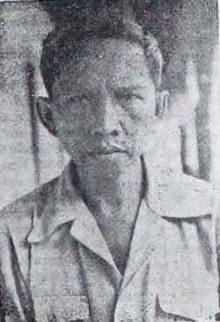Sekarmadji Maridjan Kartosoewirjo
| Soekarmadji Maridjan Kartosoewirjo | |
|---|---|
 |
|
| Imam of the Islamic State of Indonesia | |
|
In office August 7, 1949 – June 4, 1962 |
|
| Preceded by | position created |
| Succeeded by | position abolished |
| Personal details | |
| Born | January 7, 1905 |
| Died | September 5, 1962 (age 57) |
| Spouse(s) | Dewi Siti Kalsum |
| Religion | Islam |
Soekarmadji Maridjan Kartosoewirjo (January 7, 1905 – September 5, 1962) was an Indonesian Islamic mystic who led the Darul Islam rebellion against the Indonesian government from 1949 to 1962, with the objective of overthrowing the secular Pancasila ideology and establishing Negara Islam Indonesia (Islamic State of Indonesia) based on sharia law.
Kartosoewirjo was born in Cepu, an oil-producing town in Central Java, son of minor government official. His education was mostly in secular and Dutch-medium schools. While attending NIAS (Nederlands-Indische Artsen School/ Netherlands Indies Medical College) in Surabaya, Kartosoewirjo boarded at the house of Islamist leader Tjokroaminoto and became actively involved in Tjokrominoto's PSII (Partai Sarekat Islam Indonesia/ Indonesian Islamic Union Party). Kartosoewirjo abandoned his medical studies to be fully immersed in politics.
While touring Malangbong, near Garut in West Java, Kartosoewirjo met and married daughter of a local PSII leader. He settled down in this area, where he established a madrasa. In 1937, he resigned from PSII to establish his own political movement advocating a future Islamic State of Indonesia based on Islamic law.
During the Japanese occupation of Indonesia (1942–1945), Kartosoewirjo established armed militias in Garut area, one of many such groups supported and armed by the Japanese in order to help them resist any future Allied invasion. During the Indonesian National Revolution, his Darul Islam militia remained in amicable terms with the secular Republican forces until the latter withdrew from West Java according to the terms of Renville Agreement in 1948, while Kartosoewirjo continued the guerrilla struggle against occupying Dutch forces. After the second Dutch offensive (Operatie Kraai) on December 1948, Republican guerillas slipping back into West Java was attacked by Kartosoewirjo's militia, resulting in a triangular war between the Republican forces, the Darul Islam, and the Dutch army.
...
Wikipedia
